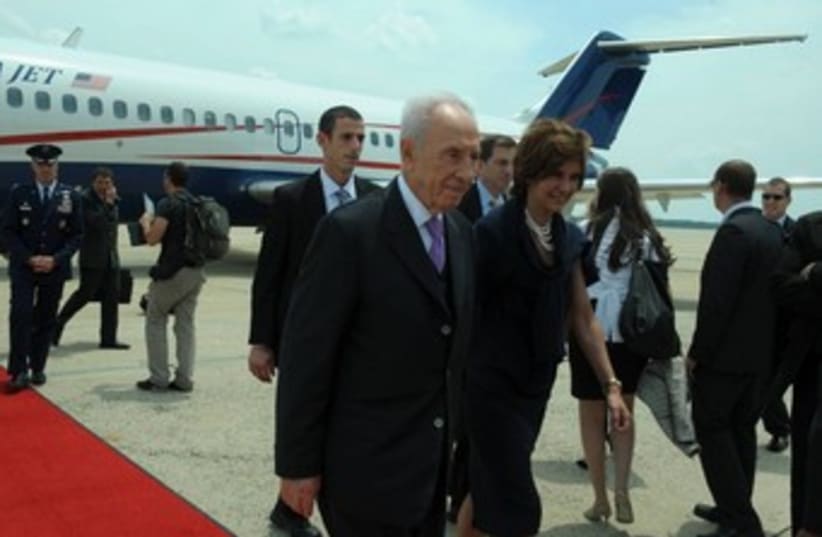My vision is an Israel living in full, genuine peace, joining with all the people of the Middle East, former enemies and new friends alike. Jerusalem becoming the capital of peace.
With expectation and hope, though mixed with doubt and skepticism, we heard the inspiring words of our president. The weary Israeli citizen may justifiably ask: Well, what is stopping us from trying? The repeatedly heard arguments that we have no partner and that they refuse to accept us here, - sound hollow.Ten years ago the Saudi/Arab-League Peace Initiative was launched. It claims to offer us peace and acceptance by the entire Arab/Muslim world. Nobody is suggesting blindly signing on the dotted line. But rather than dismissing and ignoring the Initiative, would it not have been wise to make an effort to find out if mutually acceptable terms might be negotiable?Living in Jerusalem in the late 1950s and early 60s, in Kiryat Yovel which is within spitting distance of the Jordanian border, I recall the prevailing wish for a peace settlement based on the then existing borders, i.e., the 1949 armistice lines. After all, those borders were infinitely more favorable than the convoluted 1947 UN Partition borders. In fact they gave us 80 percent of the territory of the former British Mandate, leaving a mere 20 pecent to the Arabs.Today, in fact ever since the 1970s, they are offering us just that! While we, quite incredibly, are dismissing the offer with phrases like “Auschwitz Borders.”It is interesting to note that inaction towards Arab peace initiatives is not a new phenomenon. More than 40 years ago, in May 1970, at the peak of our post-67 euphoria, Golda Meir made a Knesset statement on foreign policy and defence. In the debate that followed, MK Moshe Carmel, ex-Hagana commander and former Minister of Transport, gave details of peace initiatives by former president Gamal Abdel Nasser of Egypt as well as by King Hussein of Jordan. MK Carmel commented thus:"If those were indeed Nasser's words, they would indicate a departure from two of the three Noes of Khartoum: readiness for peace with Israel, and recognition of Israel. (...) would it not have been prudent on our part to react officially to his words…?"(Knesset Records, pages 1877-1878.)Failing a response to the Arab leaders, it would be plausible to expect a long overdue and credible Israeli Peace Initiative. In addition to standard components, such an Initiative might include the following elements:The Settlements: It has been suggested in the past (Yoram Sadeh, 1997), that some of the larger West Bank settlements, located deep inside Palestinian territory, might remain as Jewish communities in the State of Palestine. This might be seen as a kind of parallel arrangement to the Arab towns inside Israel. There would be two possibilities: The settlers may remain either as full Palestinian citizens with voting rights for the Palestinian Parliament, or as Israeli citizens voting for the Knesset. Those settlers who would not wish to remain, would of course be welcome to return home. It is unlikely that many of them would take advantage of such an offer to remain under Palestinian sovereignty. However, the very option of remaining would eliminate any undertones of deportation and eviction.Refugees: Refugees should be offered adequate compensation. A generous proportion of the restitution that we have received from Germany could be allocated for this purpose. There is, after all, an obvious connection. Also, a similar offer should be made for the considerable properties left behind by Jews from Arab countries.Jerusalem should remain a united city, open to all, and become the capital of both the State of Israel and the State of Palestine. That is, Jerusalem should be transformed into an international enclave, placed under an international regime and administered by the United Nations. This would in fact be in line with Herzl’s declared vision of an “ex-territorial” Jerusalem.In addition, our prime minister might launch a dramatic initiative to transfer UN headquarters from New York to Jerusalem. This may appear to be a pretentious idea. But bearing in mind that Jerusalem is the center of three world religions, and that such a step might put a final end to this long and festering conflict, such a proposal may eventually become to appear 'realistic'. It would make Jerusalem the World Center of the United Nations, and might have interesting implications for the status of the city, as well as for its economy and its security.Credible efforts on our part, to bring the vision of our president to fulfillment, would be widely welcomed by the Israel public.The writer is a retired Chartered Engineer. He grew up in Nazi-Germany, and lived in Sweden and England before settling in Israel in 1955. He worked with the Technion Windtunnel Laboratory for 35 years.
Fulfilling the vision of President Peres
It is time for Israel to act in trying to reach a peace agreement.
